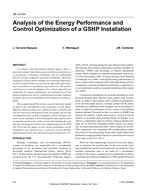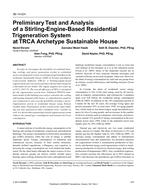-
-
Available Formats
- Options
- Availability
- Priced From ( in USD )
-
Available Formats
-
- Immediate download
- $16.00
- Add to Cart
Customers Who Bought This Also Bought
-

SE-14-006 -- Generalized Performance Maps for Single- and...
Priced From $16.00 -

SE-14-030 -- Analysis of the Energy Performance and Contr...
Priced From $16.00 -

SE-14-024 -- Preliminary Test and Analysis of a Stirling-...
Priced From $16.00 -

SE-14-011 -- Temperature Trends for Locations Listed in t...
Priced From $16.00
About This Item
Full Description
Optimizing the control of ground-coupled heat-pump systems requires consideration of the building dynamics, to maintain thermal comfort, and the borehole heat exchanger dynamics, to exploit seasonal underground thermal energy storage. For the implementation of model predictive control (MPC) the question arises whether the optimization horizon should cover the interseasonal time scale to achieve optimal system operation. This paper addresses this question for a hybrid ground-coupled heat pump (HyGCHP) system with a backup gas boiler and a backup (active) chiller for a cooling dominated office building. The optimal system operation-- found by solving the optimization problem for a prediction horizon of one year--is compared to the operation obtained with MPC with a receding horizon of one week. The results show that the operation computed with one-week horizon is identical to the operation found with one-year horizon. This indicates that for the considered HyGCHP system there is no optimization potential at the seasonal time scale.





